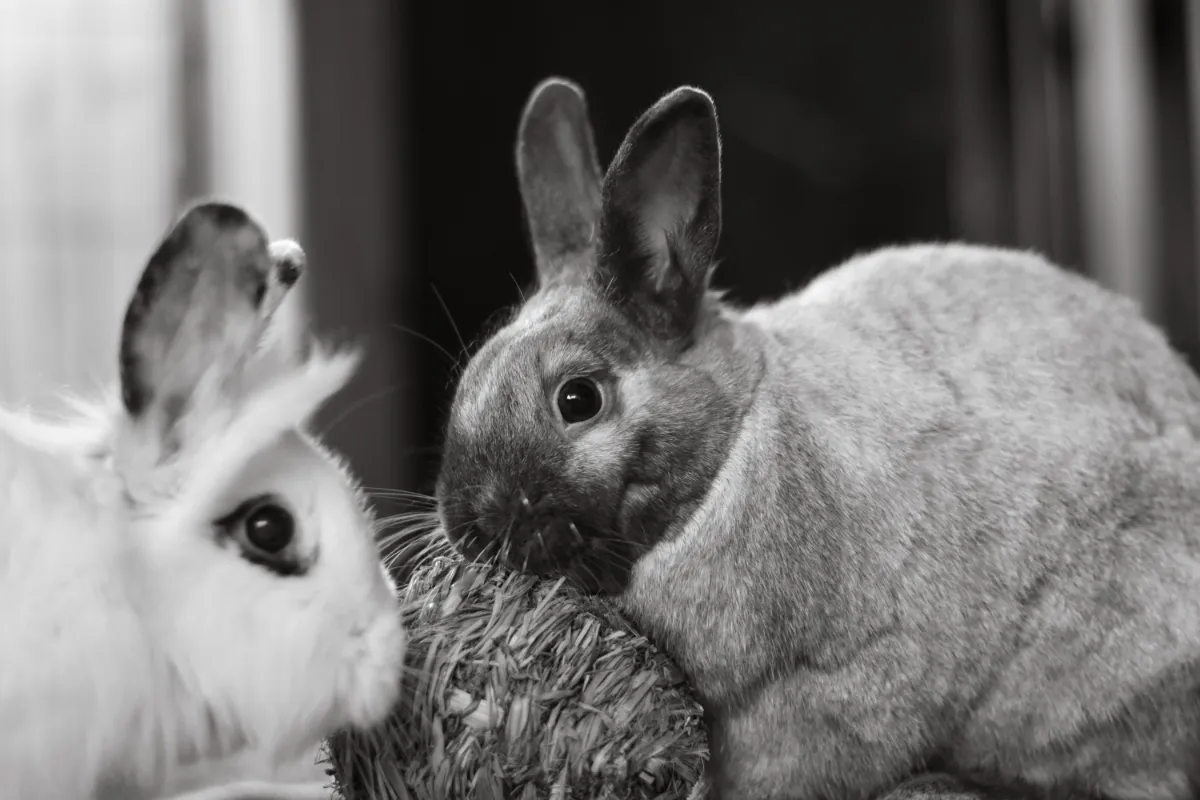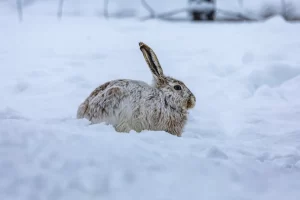Are you worried that having rabbits in your home might attract mice? Let’s explore the relationship between rabbits and mice to determine if this is just a myth or a legitimate concern.
Understanding mouse behavior and the factors that attract them will help debunk any misconceptions. Additionally, we’ll provide practical advice on how to prevent mice infestation in rabbit habitats and maintain a clean, rodent-free environment.
Stay informed and discover the truth about rabbits and mice.
In This Article
- 1 Key Takeaways
- 2 The Relationship Between Rabbits and Mice
- 3 Understanding Mouse Behavior
- 4 Factors That Attract Mice
- 5 Debunking the Myth: Do Rabbits Attract Mice
- 6 How to Prevent Mice Infestation in Rabbit Habitats
- 7 Rabbit-Friendly Pest Control Methods
- 8 Maintaining a Clean and Rodent-Free Environment
- 9 Frequently Asked Questions
- 10 Conclusion
Key Takeaways
- Rabbits and mice cohabitate in similar habitats and share food sources.
- Mice are attracted to easily accessible food sources and warm nesting areas.
- Rabbits do not attract mice, as they are herbivores and do not produce waste that attracts mice.
- To prevent mice infestation in rabbit habitats, regularly clean the habitat, seal potential entry points, use natural pest deterrents, and dispose of rabbit waste properly.
The Relationship Between Rabbits and Mice
You should frequently observe how rabbits and mice interact in order to understand their relationship. Rodent cohabitation is a common occurrence, as both rabbits and mice share similar habitats and food sources.
It’s important to note that while rabbits may attract mice due to the availability of food and shelter, they don’t necessarily have a direct relationship. Rabbits primarily eat vegetation, while mice are omnivorous and feed on a variety of food sources.
To prevent mice from entering your property, it’s advisable to implement mouse repellent techniques such as sealing all entry points, keeping the environment clean and tidy, and using natural deterrents like peppermint oil or ultrasonic devices.
Understanding the dynamics between rabbits and mice can help you effectively manage any potential rodent infestations and maintain a pest-free environment.
Understanding Mouse Behavior
Observing mouse behavior closely can provide you with valuable insights into their habits and preferences. Understanding mouse behavior is essential when dealing with a mouse infestation. Here are some key points to consider:
- Nesting: Mice typically build nests in dark, secluded areas such as attics, basements, or behind walls. Identifying these nesting sites can help in locating their hiding spots.
- Movement patterns: Mice are nocturnal creatures, so they’re most active during the night. They move quickly and can squeeze through small openings, making it important to seal any potential entry points.
- Food preferences: Mice are opportunistic eaters and will consume almost anything. However, they have a preference for grains, cereals, and seeds. Properly storing food and keeping it in sealed containers can help prevent mouse infestations.
Factors That Attract Mice
To effectively prevent rodent infestations, there are several factors to consider. Firstly, it’s important to be aware of the factors that attract mice, such as easily accessible food sources and cozy nesting areas. Mice are attracted to areas where they can find food easily. Therefore, it’s crucial to store food properly in sealed containers and clean up any spills or crumbs promptly.
In addition to food sources, mice are known to seek out warm and cozy nesting areas. This means that sealing any potential entry points into your home is crucial. This includes cracks or gaps in walls or windows. By addressing these entry points, you can significantly reduce the chances of mice finding a comfortable place to nest.
To further deter mice, there are a few options to consider. One option is to use mouse deterrents such as ultrasonic devices or natural repellents like peppermint oil. These can help create an environment that is less appealing to mice.
Lastly, it’s recommended to keep your surroundings clean and clutter-free. Mice are less likely to inhabit well-maintained areas. By regularly cleaning and organizing your living space, you can make it less attractive to rodents.
Debunking the Myth: Do Rabbits Attract Mice
Don’t be fooled by the myth – rabbits don’t attract mice, so there’s no need to worry about an infestation if you have a pet rabbit. It’s important to debunk misconceptions and separate fact from fiction when it comes to pest control. Here are some key points to consider:
- Rabbits are herbivores and don’t produce the type of waste that attracts mice.
- Mice are attracted to sources of food, water, and shelter, not rabbits.
Proper sanitation and exclusion measures are essential in preventing mice infestations. Here are some tips:
- Seal any gaps or cracks in your home to prevent mice from entering.
- Store food in airtight containers and clean up any spills or crumbs promptly.
- Regularly remove clutter and debris that can serve as hiding places for mice.
How to Prevent Mice Infestation in Rabbit Habitats
Make sure to regularly clean the rabbit habitat and remove any food debris, as well as sealing any potential entry points, for preventing mice infestation. Mice are attracted to food sources and shelter, and a dirty rabbit habitat can provide both. By keeping the habitat clean and free of food debris, you can significantly reduce the chances of mice infestation. Additionally, sealing any potential entry points, such as cracks or holes in the walls or floors, will prevent mice from gaining access to the habitat. To further prevent rodent infestation, you can also use natural pest deterrents, such as peppermint oil or vinegar, as mice dislike the strong smell. Implementing these measures will help create a safe and rodent-free environment for your rabbits.
| Cleaning Tips | Sealing Entry Points | Natural Pest Deterrents |
|---|---|---|
| Regularly clean the habitat to remove food debris and waste. | Seal any cracks or holes in the walls or floors. | Use natural deterrents like peppermint oil or vinegar. |
| Clean food bowls and water bottles daily. | Install door sweeps to prevent mice from entering. | Plant mint or lavender around the habitat as natural repellents. |
| Dispose of rabbit waste properly to avoid attracting mice. | Use wire mesh to cover ventilation and drainage openings. | Keep the habitat well-ventilated to discourage mice. |
Rabbit-Friendly Pest Control Methods
You can use a combination of natural deterrents and humane traps to effectively control pests in a rabbit-friendly way. Here are some organic pest control methods to consider:
- Encourage natural predators: Introduce natural predators such as owls, hawks, or snakes into the area to help control the pest population. These predators can help keep pests like mice and rats in check.
- Plant rabbit-resistant plants: Choose plants that rabbits are less likely to be attracted to. This can help deter rabbits from entering your garden or yard in the first place.
- Install rabbit-proof fencing: Construct a sturdy fence that’s high enough to prevent rabbits from jumping over or digging under. Make sure the fence is buried at least a few inches into the ground to prevent rabbits from burrowing through.
By implementing these natural deterrents and utilizing humane traps, you can effectively control pests while ensuring the safety and well-being of rabbits.
Maintaining a Clean and Rodent-Free Environment
To maintain a clean and rodent-free environment, regularly clean and sanitize all areas of your home. Store food in airtight containers to prevent attracting pests. Cleaning techniques such as sweeping, mopping, and vacuuming can help eliminate food particles and debris that may attract rodents. Pay special attention to areas where crumbs and spills may accumulate, such as the kitchen and dining areas.
Additionally, consider using natural deterrents such as peppermint oil or vinegar to repel mice. These natural substances can be applied to areas where mice are commonly found, such as entry points and nesting areas. Remember to seal any cracks or openings in your home to prevent mice from entering.
Frequently Asked Questions
Can Rabbits and Mice Live Together in the Same Habitat?
Rabbits and mice can coexist in the same habitat, but it’s important to design the habitat properly to prevent mouse infestations. Consider using barriers, regular cleaning, and storing food securely to minimize interactions between the two species.
Are There Any Benefits to Having Mice in a Rabbit Habitat?
Having mice in a rabbit habitat does not provide any benefits. In fact, mice can negatively affect rabbit health by spreading diseases, competing for resources, and causing damage to their habitat.
How Do Mice Affect Rabbit Health and Well-Being?
Mice can negatively impact rabbit health and well-being. Their presence can stress rabbits, compromise their immune system, and spread diseases. It’s important to address this issue to ensure the health of your rabbits.
Can Rabbits Attract Mice Even if They Are Kept Indoors?
Indoor rabbits can attract mice if they have accessible food and shelter. To prevent mice infestation, ensure rabbit food is stored properly, seal any entry points, and keep the environment clean and clutter-free.
What Are Some Natural Ways to Repel Mice From Rabbit Habitats?
To create a mouse-proof habitat for rabbits, use natural mouse repellents like peppermint oil or vinegar. Seal any entry points, remove potential food sources, and keep the area clean. These measures will help keep mice away.
Conclusion
In conclusion, the myth that rabbits attract mice isn’t supported by scientific evidence. While mice may be attracted to certain factors such as food and shelter, rabbits themselves don’t attract mice.
It’s important to maintain a clean and rodent-free environment in rabbit habitats to prevent mice infestation. By following proper pest control methods and ensuring a clean living space for rabbits, you can create a safe and healthy environment for these furry companions.





